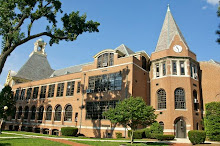Interesting story in today's New York Times about how the human brain learns math.
An excerpt:
For much of the last century, educators and many scientists believed that children could not learn math at all before the age of five, that their brains simply were not ready.
But recent research has turned that assumption on its head — that, and a host of other conventional wisdom about geometry, reading, language and self-control in class. The findings, mostly from a branch of research called cognitive neuroscience, are helping to clarify when young brains are best able to grasp fundamental concepts.
In one recent study, for instance, researchers found that most entering preschoolers could perform rudimentary division, by distributing candies among two or three play animals. In another, scientists found that the brain’s ability to link letter combinations with sounds may not be fully developed until age 11 — much later than many have assumed.
The teaching of basic academic skills, until now largely the realm of tradition and guesswork, is giving way to approaches based on cognitive science. In several cities, including Boston, Washington and Nashville, schools have been experimenting with new curriculums to improve math skills in preschoolers. In others, teachers have used techniques developed by brain scientists to help children overcome dyslexia.
And schools in about a dozen states have begun to use a program intended to accelerate the development of young students’ frontal lobes, improving self-control in class.
“Teaching is an ancient craft, and yet we really have had no idea how it affected the developing brain,” said Kurt Fischer, director of the Mind, Brain and Education program at Harvard. “Well, that is beginning to change, and for the first time we are seeing the fields of brain science and education work together.”
The story goes on to describe several examples of innovative programs based on the science of the brain. Click here for the full article.
Welcome!
Welcome to Laurie Goodman's blog. I use this space to share news and opinions about education and schools in Ridgewood, the state of New Jersey and the nation, in addition to other issues I'm personally interested in. I invite you to share your thoughts, feelings, questions or opinions, too, by posting comments on any blog entry. Please observe basic courtesy -- keep your comments focused on issues, no personal attacks or bullying, please. Contact me directly at: lauriegood@mac.com
Sunday, December 20, 2009
Subscribe to:
Post Comments (Atom)






1 comment:
You can tell a lot about a person by the newpaper they read.
Post a Comment